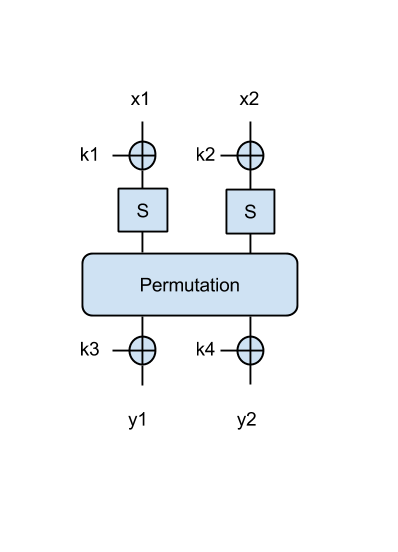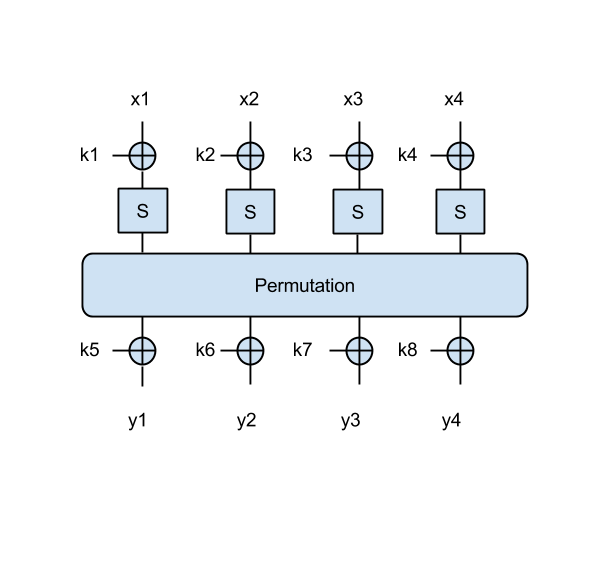This is an old revision of the document!
Laboratorul 04 - PRFs, PRPs, SPNs
Prezentarea PowerPoint pentru acest laborator poate fi găsită aici.
- utils.py
import base64 # CONVERSION FUNCTIONS def _chunks(string, chunk_size): for i in range(0, len(string), chunk_size): yield string[i:i+chunk_size] # THIS ONE IS NEW def byte_2_bin(bval): """ Transform a byte (8-bit) value into a bitstring """ return bin(bval)[2:].zfill(8) def _hex(x): return format(x, '02x') def hex_2_bin(data): return ''.join(f'{int(x, 16):08b}' for x in _chunks(data, 2)) def str_2_bin(data): return ''.join(f'{ord(c):08b}' for c in data) def bin_2_hex(data): return ''.join(f'{int(b, 2):02x}' for b in _chunks(data, 8)) def str_2_hex(data): return ''.join(f'{ord(c):02x}' for c in data) def bin_2_str(data): return ''.join(chr(int(b, 2)) for b in _chunks(data, 8)) def hex_2_str(data): return ''.join(chr(int(x, 16)) for x in _chunks(data, 2)) # XOR FUNCTIONS def strxor(a, b): # xor two strings, trims the longer input return ''.join(chr(ord(x) ^ ord(y)) for (x, y) in zip(a, b)) def bitxor(a, b): # xor two bit-strings, trims the longer input return ''.join(str(int(x) ^ int(y)) for (x, y) in zip(a, b)) def hexxor(a, b): # xor two hex-strings, trims the longer input return ''.join(_hex(int(x, 16) ^ int(y, 16)) for (x, y) in zip(_chunks(a, 2), _chunks(b, 2))) # BASE64 FUNCTIONS def b64decode(data): return bytes_to_string(base64.b64decode(string_to_bytes(data))) def b64encode(data): return bytes_to_string(base64.b64encode(string_to_bytes(data))) # PYTHON3 'BYTES' FUNCTIONS def bytes_to_string(bytes_data): return bytes_data.decode() # default utf-8 def string_to_bytes(string_data): return string_data.encode() # default utf-8
In acest laborator veti avea niste exercitii ce folosesc PRFs, PRPs si DES. Puteti sa va uitati in cursul de aici ca sa va aduceti aminte lucrurile de baza.
Exercițiul 1 (4p)
Fie $F : K × X \to Y$ un $PRF$ sigur cu $K = X = Y = \{0, 1\}^{n}$.
- a) Arătați că $F_1(k,x) = F(k,x) \| 0$ nu e un $PRF$ sigur.
- b) Arătați că $F_2(k, x) = F \left(k, x \oplus 1^{n}\right)$ este un $PRF$ sigur.
- c) Fie $K_3 = \{0, 1\}^{n+1}$. Construiți un nou $PRF$ $F_3 : K_3 \times X \to Y$ care să aibă urmatoarea proprietate: $PRF$-ul $F_3$ este sigur, dar dacă adversarul află ultimul bit din cheie atunci $PRF$-ul nu mai e sigur. Puteți astfel observa că până și aflarea unui singur bit din cheia secretă poate compromite siguranța unui $PRF$ .
- d) Construiți un nou $PRF$ $F_4 : K × X \to Y$ care rămâne sigur chiar și atunci când atacatorul cunoaște unul (oricare) dintre biții cheii. Funcția voastră $F_4$ trebuie să cheme o singură dată funcția $F$. Explicați de ce rămâne un $PRF$ sigur chiar și după această scurgere de informație.
Exercise 2-3-4
Vom analiza acum retele substitutie-permutare (SPN - substitution-permutation networks)
SPN 1 (3p)
Avem urmatorul SPN din figura:
unde S este un S-box din AES (detalii vor fi prezentate la curs), iar 'Permutation' este un bloc care doar sifteaza toti bitii cu 4 pozitii la dreapta in mod ciclic. Atat S-boxurile cat si permutarea sunt inversabile si cunoscute de atacator (de voi). Fiecare intrare (x1, x2) are 8 biti (1 byte). Cheile k1, k2, si iesirile y1, y2 au de asemenea dimensiunea de 1 byte.
- Cum puteti determina cheia?
- Fiind data o pereche mesaj/ciphertext ('Hi' - char, 0xba52 - hex), gasiti k1 si k2. Afisati-le in ASCII.
- spn1.py
from utils import * # Rijndael S-box sbox = [0x63, 0x7c, 0x77, 0x7b, 0xf2, 0x6b, 0x6f, 0xc5, 0x30, 0x01, 0x67, 0x2b, 0xfe, 0xd7, 0xab, 0x76, 0xca, 0x82, 0xc9, 0x7d, 0xfa, 0x59, 0x47, 0xf0, 0xad, 0xd4, 0xa2, 0xaf, 0x9c, 0xa4, 0x72, 0xc0, 0xb7, 0xfd, 0x93, 0x26, 0x36, 0x3f, 0xf7, 0xcc, 0x34, 0xa5, 0xe5, 0xf1, 0x71, 0xd8, 0x31, 0x15, 0x04, 0xc7, 0x23, 0xc3, 0x18, 0x96, 0x05, 0x9a, 0x07, 0x12, 0x80, 0xe2, 0xeb, 0x27, 0xb2, 0x75, 0x09, 0x83, 0x2c, 0x1a, 0x1b, 0x6e, 0x5a, 0xa0, 0x52, 0x3b, 0xd6, 0xb3, 0x29, 0xe3, 0x2f, 0x84, 0x53, 0xd1, 0x00, 0xed, 0x20, 0xfc, 0xb1, 0x5b, 0x6a, 0xcb, 0xbe, 0x39, 0x4a, 0x4c, 0x58, 0xcf, 0xd0, 0xef, 0xaa, 0xfb, 0x43, 0x4d, 0x33, 0x85, 0x45, 0xf9, 0x02, 0x7f, 0x50, 0x3c, 0x9f, 0xa8, 0x51, 0xa3, 0x40, 0x8f, 0x92, 0x9d, 0x38, 0xf5, 0xbc, 0xb6, 0xda, 0x21, 0x10, 0xff, 0xf3, 0xd2, 0xcd, 0x0c, 0x13, 0xec, 0x5f, 0x97, 0x44, 0x17, 0xc4, 0xa7, 0x7e, 0x3d, 0x64, 0x5d, 0x19, 0x73, 0x60, 0x81, 0x4f, 0xdc, 0x22, 0x2a, 0x90, 0x88, 0x46, 0xee, 0xb8, 0x14, 0xde, 0x5e, 0x0b, 0xdb, 0xe0, 0x32, 0x3a, 0x0a, 0x49, 0x06, 0x24, 0x5c, 0xc2, 0xd3, 0xac, 0x62, 0x91, 0x95, 0xe4, 0x79, 0xe7, 0xc8, 0x37, 0x6d, 0x8d, 0xd5, 0x4e, 0xa9, 0x6c, 0x56, 0xf4, 0xea, 0x65, 0x7a, 0xae, 0x08, 0xba, 0x78, 0x25, 0x2e, 0x1c, 0xa6, 0xb4, 0xc6, 0xe8, 0xdd, 0x74, 0x1f, 0x4b, 0xbd, 0x8b, 0x8a, 0x70, 0x3e, 0xb5, 0x66, 0x48, 0x03, 0xf6, 0x0e, 0x61, 0x35, 0x57, 0xb9, 0x86, 0xc1, 0x1d, 0x9e, 0xe1, 0xf8, 0x98, 0x11, 0x69, 0xd9, 0x8e, 0x94, 0x9b, 0x1e, 0x87, 0xe9, 0xce, 0x55, 0x28, 0xdf, 0x8c, 0xa1, 0x89, 0x0d, 0xbf, 0xe6, 0x42, 0x68, 0x41, 0x99, 0x2d, 0x0f, 0xb0, 0x54, 0xbb, 0x16] # Rijndael Inverted S-box rsbox = [0x52, 0x09, 0x6a, 0xd5, 0x30, 0x36, 0xa5, 0x38, 0xbf, 0x40, 0xa3, 0x9e, 0x81, 0xf3, 0xd7, 0xfb, 0x7c, 0xe3, 0x39, 0x82, 0x9b, 0x2f, 0xff, 0x87, 0x34, 0x8e, 0x43, 0x44, 0xc4, 0xde, 0xe9, 0xcb, 0x54, 0x7b, 0x94, 0x32, 0xa6, 0xc2, 0x23, 0x3d, 0xee, 0x4c, 0x95, 0x0b, 0x42, 0xfa, 0xc3, 0x4e, 0x08, 0x2e, 0xa1, 0x66, 0x28, 0xd9, 0x24, 0xb2, 0x76, 0x5b, 0xa2, 0x49, 0x6d, 0x8b, 0xd1, 0x25, 0x72, 0xf8, 0xf6, 0x64, 0x86, 0x68, 0x98, 0x16, 0xd4, 0xa4, 0x5c, 0xcc, 0x5d, 0x65, 0xb6, 0x92, 0x6c, 0x70, 0x48, 0x50, 0xfd, 0xed, 0xb9, 0xda, 0x5e, 0x15, 0x46, 0x57, 0xa7, 0x8d, 0x9d, 0x84, 0x90, 0xd8, 0xab, 0x00, 0x8c, 0xbc, 0xd3, 0x0a, 0xf7, 0xe4, 0x58, 0x05, 0xb8, 0xb3, 0x45, 0x06, 0xd0, 0x2c, 0x1e, 0x8f, 0xca, 0x3f, 0x0f, 0x02, 0xc1, 0xaf, 0xbd, 0x03, 0x01, 0x13, 0x8a, 0x6b, 0x3a, 0x91, 0x11, 0x41, 0x4f, 0x67, 0xdc, 0xea, 0x97, 0xf2, 0xcf, 0xce, 0xf0, 0xb4, 0xe6, 0x73, 0x96, 0xac, 0x74, 0x22, 0xe7, 0xad, 0x35, 0x85, 0xe2, 0xf9, 0x37, 0xe8, 0x1c, 0x75, 0xdf, 0x6e, 0x47, 0xf1, 0x1a, 0x71, 0x1d, 0x29, 0xc5, 0x89, 0x6f, 0xb7, 0x62, 0x0e, 0xaa, 0x18, 0xbe, 0x1b, 0xfc, 0x56, 0x3e, 0x4b, 0xc6, 0xd2, 0x79, 0x20, 0x9a, 0xdb, 0xc0, 0xfe, 0x78, 0xcd, 0x5a, 0xf4, 0x1f, 0xdd, 0xa8, 0x33, 0x88, 0x07, 0xc7, 0x31, 0xb1, 0x12, 0x10, 0x59, 0x27, 0x80, 0xec, 0x5f, 0x60, 0x51, 0x7f, 0xa9, 0x19, 0xb5, 0x4a, 0x0d, 0x2d, 0xe5, 0x7a, 0x9f, 0x93, 0xc9, 0x9c, 0xef, 0xa0, 0xe0, 0x3b, 0x4d, 0xae, 0x2a, 0xf5, 0xb0, 0xc8, 0xeb, 0xbb, 0x3c, 0x83, 0x53, 0x99, 0x61, 0x17, 0x2b, 0x04, 0x7e, 0xba, 0x77, 0xd6, 0x26, 0xe1, 0x69, 0x14, 0x63, 0x55, 0x21, 0x0c, 0x7d] def permute4(s): """ Perform a permutatation by shifting all bits 4 positions right. The input is assumed to be a 16-bit bitstring """ ps = '' ps = ps + s[12:16] ps = ps + s[0:12] return ps def permute_inv4(s): """ Perform the inverse of permute4 The input is assumed to be a 16-bit bitstring """ ps = '' ps = ps + s[4:16] ps = ps + s[0:4] return ps def spn_1r_reduced_2s(k, x): """ Performs an encryption with a substitution-permutation network. Key k = {k1, k2}, total of 16 bits (2 x 8 bits) Input x = {x1, x2}, total of 16 bits (2 x 8 bits) Both k and x are assumed to be bitstrings. Return: a 16-bit bitstring containing the encryption y = {y1, y2} """ # Split input and key x1 = x[0:8] x2 = x[8:16] k1 = k[0:8] k2 = k[8:16] # Apply S-box u1 = bitxor(x1, k1) v1 = sbox[int(u1, 2)] v1 = byte_2_bin(v1) u2 = bitxor(x2, k2) v2 = sbox[int(u2, 2)] v2 = byte_2_bin(v2) # Apply permutation pin = v1 + v2 pout = permute4(pin) return pout def spn_1r_full_2s(k, x): """ Performs an encryption with a substitution-permutation network. Key k = {k1, k2, k3, k4}, total of 32 bits (4 x 8 bits) Input x = {x1, x2}, total of 16 bits (2 x 8 bits) Both k and x are assumed to be bitstrings. Return: a 16-bit bitstring containing the encryption y = {y1, y2} """ # Split input and key x1 = x[0:8] x2 = x[8:16] k1 = k[0:8] k2 = k[8:16] k3 = k[16:24] k4 = k[24:32] # Apply S-box u1 = bitxor(x1, k1) v1 = sbox[int(u1, 2)] v1 = byte_2_bin(v1) u2 = bitxor(x2, k2) v2 = sbox[int(u2, 2)] v2 = byte_2_bin(v2) # Apply permutation pin = v1 + v2 pout = permute4(pin) # Apply final XOR po1 = pout[0:8] po2 = pout[8:16] y1 = bitxor(po1, k3) y2 = bitxor(po2, k4) return y1+y2 def main(): # Run reduced 2-byte SPN msg = 'Hi' key = '??' # Find this xs = str_2_bin(msg) ks = str_2_bin(key) ys = spn_1r_reduced_2s(ks, xs) print('Two y halves of reduced SPN: ' + ys[0:8] + ' (hex: ' + bin_2_hex( ys[0:8]) + '), ' + ys[8:16] + ' (hex: ' + bin_2_hex(ys[8:16]) + ')') # Run full 2-byte SPN msg = 'Om' key = '????' # Find this xs = str_2_bin(msg) ks = str_2_bin(key) ys = spn_1r_full_2s(ks, xs) print('Two y halves of full SPN (2 bytes): ' + ys[0:8] + ' (hex: ' + bin_2_hex( ys[0:8]) + '), ' + ys[8:16] + ' (hex: ' + bin_2_hex(ys[8:16]) + ')') if __name__ == "__main__": main()
SPN 2 (3p)
Vom folosi acum un SPN mai mai bun unde rezultatul permutarilor este XOR-at cu alti 2 octeti din cheie k3 si k4, ca in figura:
- Gasiti cheia stiind urmatoarele perechi mesaj/ciphertext: ('Om', 0x0073), ('El', 0xd00e), ('an', 0x855b). Afisati-o in ASCII
SPN 3 (Bonus)
In acest exercitiu vom folosi un bloc mai mare. In acest SPN sunt introdusi 4 octeti x=[x1 || x2 || x3 || x4], iar cheia folosita contine 8 octeti k=[k1 || k2 || k3 || k4 || k5 || k6 || k7 || k8] ca in figura:
Ca si in SPN-ul precedent, permutarea roteste toti octetii la dreapta cu 4 biti.
- Gasiti cheia stiind urmatoarele perechi mesaj/ciphertext: ('Omul', 0xddcf7bc7), ('stea', 0x96d58b43), ('luna', 0x9c3f2303)



